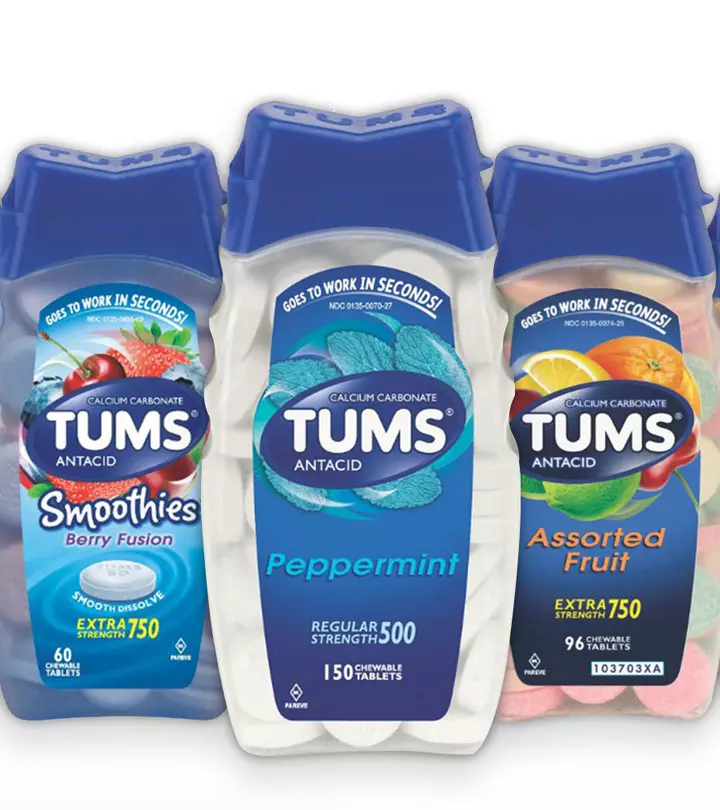
Image: ShutterStock
Tums is an over-the-counter antacid that is often used to relieve heartburn or indigestion. Even pregnant women take it as a go-to for heartburn, especially during the third trimester. But is it safe to have tums during pregnancy?
Heartburn during pregnancy is fairly common. But it needs to be treated with proper advice from the doctor to avoid any underlying complications (1). Read on to know about the safety of using Tums while pregnant, the necessary precaution to take while having it, and its potential side effects.
Key Pointers
- Tums is an antacid that can be taken during pregnancy under medical guidance to treat heartburn and acidity.
- However, using Tums during pregnancy may cause severe side effects, such as dry mouth, stomach pain, nausea, vomiting, and frequent urination.
- Tums contains calcium, making it a potential source of calcium during pregnancy.
- It is important to avoid exceeding the prescribed dosage of Tums, as it may interfere with the absorption of other essential vitamins.
What Is Tums?
Tums is an antacid comprising sucrose (sugar) and calcium carbonate. It is the brand name for a specific variety of antacid that is manufactured by GlaxoSmithKline. The drug is available over-the-counter (OTC) at most retail stores in the US.
Tums is known to provide quick and effective relief from heartburn, indigestion, gas, acid reflux, bloating and stomach upset. The medication is available in the form of chewable tablets, which come in a variety of flavors (2).
Briefing her approach to addressing heartburn with Tums during pregnancy, a mother and blogger recounts, “I felt the most comfortable taking Tums as they’re just acid-neutralizing calcium. In fact, I figured I was doing the baby a favor by upping his or her calcium supplement (i).”
During pregnancy, you may have cravings for spicy food that may cause heartburn. In an event like this, it is important for you to seek prenatal care guidance and resolve your gastrointestinal issues by taking prescribed medications. This ensures little or no negative impact on maternal health and nutrition.
 Quick fact
Quick factIs It Safe To Take Tums When Pregnant?
Yes, Tums is safe for pregnant women, but only when its potential benefits outweigh the possible risks. The US FDA has classified the medicine under category C drugs, which means animal studies have shown adverse effects on the fetus but the drug has not been tested on humans (3).
Side Effects Of Tums During Pregnancy
Unlike a few other medications, Tums is likely to cause specific potential side effects during pregnancy. They are:
- Dry mouth
- Stomach pain
- Nausea and vomiting
- Constipation
- Burping or BelchingiRelease of air from the stomach through the mouth, commonly known as burping.
- Frequent urge to urinate
You need to be cautious, and keep a few things in mind when taking Tums during pregnancy.
- Avoid taking Tums if you have a history of kidney disorder or parathyroid gland disorderiDisorders of the parathyroid (glands located behind the thyroid) resulting in abnormal production of calcium. . Tums, which is high in calcium content, might lead to kidney stone formation and imbalance the calcium levels in the body (4).
- Ask your doctor about the right dosage to take to prevent side effects. Do not exceed the required dosage.
- Taking Tums for heartburn can increase your calcium intake, but the medication should not be used as a calcium supplement during pregnancy.
 Point to consider
Point to considerIdeal Dosage Of Tums During Pregnancy

You may take two to four tablets of Tums every two hours to get the needed relief from heartburn (5). However, you should consult a doctor before taking any antacid during pregnancy. Also, always maintain a gap of at least two hours between taking an antacid and iron supplements to derive maximum benefits from both the medicines (6).
How Does Tums Help You During Pregnancy?

The doctor might allow you to take the medicine for quick relief from heartburn caused by acidity. Usually, antacids that contain calcium and magnesium are used as the first-line treatment for treating heartburn during pregnancy (7). Since Tums is a good source of calcium, taking them for heartburn will also increase your calcium intake and help you get the ideal amount of the nutrient during pregnancy.
The right amount of calcium in your diet prevents lead absorption in bones and may also lower the risk of hypertensive disordersiConditions marked by elevated blood pressure levels during pregnancy, posing the risk of adverse maternal and fetal outcomes. and preeclampsiaiA pregnancy disorder characterized by high blood pressure, water retention, and protein content in urine. (8) (9).
Over usage of the medicine, however, could have adverse effects on you. Next, we address some commonly asked questions about Tums during pregnancy.
Frequently Asked Questions
1. Can I take Eno Tums while pregnant?
Yes, you can use Eno Tums, which is just another brand of the antacid that has similar effects.
2. Besides Tums, what else can I take for heartburn during pregnancy?
You may consider taking other antacids such as Rolaids, Maalox, Pepcid and Mylanta (10). However, check with your healthcare provider before using any of these medications. Besides medication, making small dietary changes like eating smaller meals, avoiding acidic and spicy foods, drinking lots of water, consuming unsweetened coconut water, and mint tea can also provide relief from heartburn. Check with your doctor if you can take probiotics to improve your digestion during pregnancy.
3. Can I take Tums and Zofran together?
Yes, Tums and Zofran can be taken together, since there are no studies to show that their interaction is negative. While Tums is for heartburn, Zofran treats nausea and morning sickness.
4. Can I take Tums for nausea while pregnant?
Yes, Tums might help in relieving nausea, which is likely to occur alongside heartburn or an upset stomach.
5. Can too many Tums hurt the baby during pregnancy?
Yes, excessive intake of Tums can increase calcium levels in the body (hypercalcemia), which is known to cause maternal, fetal and neonatal complications. (11)
6. What meds cannot be taken with Tums?
Tums contain calcium carbonate. This medication should not be taken together with drugs such as bisphosphonates, fluoroquinolone and tetracycline antibiotics, thyroid hormones, proton-pump-inhibitors (e.g., omeprazole), iron supplements, and anti-arrhythmic drugs (e.g., verapamil) as tums may hinder their absorption and effectiveness (12).
7. Is it okay to take Tums every day while pregnant?
As per the manufacturer’s instructions, Tums should not be taken for symptoms exceeding two weeks. Therefore, it is advisable to consult a doctor if you are taking medicine during pregnancy (13).
8. How quickly do Tums work during pregnancy?
The manufacturer claims that Tums provides fast relief from heartburn and upset stomach as it works immediately by neutralizing stomach acid on contact (13).
9. What should I discuss with my doctor before taking Tums?
Before taking Tums, discuss your overall health status, any existing medical conditions, and all medications you are currently taking with your healthcare provider. This conversation will ensure that Tums is safe and appropriate for your specific situation.
Tums is a popular OTC antacid. The medication is quick-acting and available in different flavors as chewable tablets. It can help deal with common pregnancy problems, such as heartburn and indigestion. However, there is not enough research done to establish the safety of Tums during pregnancy. The doctor will prescribe it only if the benefits outweigh the risks. Avoid over intake as it may hamper the absorption of the essential vitamins. The best advice is to stay away from spicy and fattening food that would lead to heartburn. Ultimately, while Tums can be a helpful remedy for managing heartburn during pregnancy, it is essential to consult with a healthcare provider to determine the best course of action based on individual health needs.
Infographic: Possible Side Effects Of Consuming Tums During Pregnancy
Heartburn is a common complication that occurs when expecting. While taking precautions, like avoiding spicy foods and eating smaller meals, can help prevent the condition, Tums is an OTC antacid that can provide symptomatic relief. However, taking Tums during pregnancy may also lead to some side effects highlighted in the infographic below. Illustration: Momjunction Design Team
Illustration: Can You Take Tums During Pregnancy For Heartburn and Nausea?

Image: Dall·E/MomJunction Design Team
Personal Experience: Source
MomJunction articles include first-hand experiences to provide you with better insights through real-life narratives. Here are the sources of personal accounts referenced in this article.
i. Tums during pregnancy;https://crunchyish.wordpress.com/tag/tums-during-pregnancy/
References
1. James P Neilson; Interventions for heartburn in pregnancy; Cochrane Database Syst Rev; 2014
2. TUMS EX– calcium carbonate tablet; U.S. National Library Of Medicine; 2016
3. Over-the-Counter Medications in Pregnancy.
4. P. M. Doubilet et al.; Diagnostic Criteria for Nonviable Pregnancy Early in the First Trimester; The New England Journal of Medicine (2013)
5. Medications Safe For Pregnancy; University of Illinois Hospital & Health Sciences System; 2018
6. Taking iron supplements; US National Library of Medicine
7. R Law et al.; Treatment of heartburn and acid reflux associated with nausea and vomiting during pregnancy; Motherisk (2010)
8. Heartburn; St. Clair Health
9. Dietary calcium and health; British Nutrition Foundation
10. Safe Medications During Pregnancy; Northeast Georgia Physicians Group
11. E Rey et al.; Hypercalcemia in pregnancy – a multifaceted challenge: case reports and literature review; Clin Case Rep. (2016)
12. Kristina Fritz et al.;Calcium Carbonate; National Library of Medicine (2022)
13. Tums FAQ; tums.com
Community Experiences
Join the conversation and become a part of our nurturing community! Share your stories, experiences, and insights to connect with fellow parents.
Read full bio of Dr. Anita Gupta
Read full bio of Rebecca Malachi
Read full bio of Swati Patwal
Read full bio of Dr. Joyani Das



















